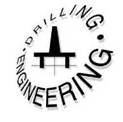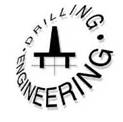 Graphical Method for Optimization of Hydraulics Programme
Graphical Method for Optimization of Hydraulics Programme
Given that the power and pressure limitations of the system the geometry of the circulating system and the fluid properties are to a great extent fixed, the only control that an engineer has over the optimization process is to select the pump rate and nozzles for the bit. The following method may be used to determine the optimum nozzle configuration and pumping rates. These calculations would be performed on the rigsite with information gathered just before pulling one bit from the hole and prior to running the next bit in hole.
1. Determine and draw the following lines on a log/log chart of Pressure vs. flowrate.
a) Maximum flowrate, Qmax (i. e. critical velocity).
b) Minimum flowrate, Qmin (i. e. slip velocity).
c) Maximum allowable surface pressure, Pmax
Note :
1. the critical velocity is the velocity below which the fluid in the annulus is in laminar flow.
2. the slip velocity is the velocity below which the cuttings will settle onto and form a bed on the low side wall of the wellbore.
2. Record pump-pressures (Psurf) for three different pump rates, just before pulling the bit.
3. Calculate the bit pressure loss (Pbit) for each pumprate.
|
|
where,
|
P Q |
pressure loss across the bit, psi density of the mud, psi/ft flowrate, gpm
Total flow area through the bit, in2
4. Calculate the pressure loss through the circulating system (Pcirc) for each flowrate P. = P — P.
Л1ГЛ nurf Kit
circ surf bit
5. Plot Pcirc vs. Q on the log/log chart and draw a line between the points.
6. Measure the slope (n) of the line. Determine the value of W from Table 1
|
|
7. Calculate the optimum circulating system pressure loss (Pcircopt).
|
|
|
max |
Note : W is a factor dependant on the value of the exponent ‘n’ in the empirical equation relating flowrate to pressure loss in the circulating system.
8. The intersection of Pcirc with the Pcirc line on the chart specifies the optimum flowrate (Qopt).
9. Calculate optimum nozzle area :
|
|
|
Nozzle area = |
10. Obtain optimum nozzle sizes for next bit run from Table 2.
|
n |
2.0 1.9 1.8 1.7 1.6 1.5 1.4 1.3 1.2 1.1 1.0
W IF 0.50 0.51 0.53 0.54 0.56 0.57 0.59 0.61 0.60 0.65 0.67
W HHP 0.33 0.34 0.36 0.37 0.38 0.40 0.42 0.43 0.45 0.48 0.50
Table 1 Circulating System Factor
|
NOZZLE |
NOZZLE |
|
SIZE |
AREA (in.2) |
|
18-18-18 |
0.75 |
|
18-19-17 |
0.72 |
|
18-17-17 |
0.69 |
|
17-17-17 |
0.67 |
|
17-17-16 |
0.64 |
|
17-16-16 |
0.61 |
|
16-16-16 |
0.59 |
|
16-16-15 |
0.57 |
|
16-15-15 |
0.54 |
|
15-15-15 |
0.52 |
|
15-15-14 |
0.50 |
|
15-14-14 |
0.47 |
|
14-14-14 |
0.45 |
|
14-14-13 |
0.43 |
|
14-13-13 |
0.41 |
|
13-13-13 |
0.39 |
|
13-13-12 |
0.37 |
|
13-12-12 |
0.35 |
|
12-12-12 |
0.33 |
|
12-12-11 |
0.31 |
|
12-11-11 |
0.30 |
|
11-11-11 |
0.28 |
|
11-11-10 |
0.26 |
|
11-10-10 |
0.25 |
|
10-10-10 |
0.23 |
|
10-10-9 |
0.22 |
|
10-9-9 |
0.20 |
|
9-9-9 |
0.19 |
|
9-9-8 |
0.17 |
|
9-8-8 |
0.16 |
|
Table 2 Nozzle Area and sizes |
|
|
EXERCISE 3 Hydraulics Optimisation
Whilst drilling the 12 1/4” hole section of NONAME1 at 8000 ft. the cost/ft of the bit run was found to have reached its minima and to be increasing. It was therefore decided to pull the bit and run another bit. Determine the mozzle configuration that will optimise the hydraulic horsepower at the bit in the next bit run.
To assist in the selection of the nozzle configuration which will optimise the hydraulic horsepower at the bit the following circulation rate test was performed :
|
Pump Rate Circulating Pressure
|
The test was conducted with 3 x 14 nozzles in the bit and 6 1/2” liners in the pumps
All other relevant information was also compiled :
Minimum Annular Velocity 110 ft/min.
Mud Density : 10 ppg
Pump Data : Type National Triplex 12-P-160T
TOC o "1-5" h z HP 1600
Max. SPM 120
Stroke 12”
Liner Size 5 3/4”,6 1/2”,7”
Ev 0.95
E„ 0.90
Drillstring data : Drillpipe 5" 19.5 lb/ft
Exercise 1 Determination of Fluid Flow Regime:
a. The flow regime will be determined from the Reynolds number equation:
N 928pvd
NRe — ц
N — 928 x 10 x v x 4.276
Re
20
— 1984 x v
and since, v — Q (gpm) ft/sec.
2.448 x d2
— 400 — 8.937 ft/sec.
2.448 x 4.2762
Therefore, N — 1984 x 8.937
Re
— 17725 The fluid is therefore in Turbulent Flow
b. The maximum flowrate to ensure laminar flow would require that the Reynolds number was less than 2100. Hence,
2100 = 928 x 10 x v x 4.276 20
Max. Velo. v = 1.06 ft/sec
1.6 = Q
2.448 x 4.2762
Therefore,
Maximum Flowrate, Q = 47.5 gpm
|
|


